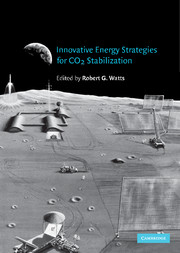Book contents
- Frontmatter
- Contents
- List of contributors
- 1 Concerns about Climate Change and Global Warming
- 2 Posing the Problem
- 3 Adaptive Strategies for Climate Change
- 4 Energy Efficiency: a Little Goes a Long Way
- 5 The Potential of Renewable Energy to Reduce Carbon Emissions
- 6 Carbonless Transportation and Energy Storage in Future Energy Systems
- 7 What Can Nuclear Power Accomplish to Reduce CO2 Emissions
- 8 Nuclear Fusion Energy
- 9 Energy Prosperity Within the Twenty-first Century and Beyond: Options and the Unique Roles of the Sun and the Moon
- 10 Geoengineering the Climate: History and Prospect
- Index
4 - Energy Efficiency: a Little Goes a Long Way
Published online by Cambridge University Press: 22 October 2009
- Frontmatter
- Contents
- List of contributors
- 1 Concerns about Climate Change and Global Warming
- 2 Posing the Problem
- 3 Adaptive Strategies for Climate Change
- 4 Energy Efficiency: a Little Goes a Long Way
- 5 The Potential of Renewable Energy to Reduce Carbon Emissions
- 6 Carbonless Transportation and Energy Storage in Future Energy Systems
- 7 What Can Nuclear Power Accomplish to Reduce CO2 Emissions
- 8 Nuclear Fusion Energy
- 9 Energy Prosperity Within the Twenty-first Century and Beyond: Options and the Unique Roles of the Sun and the Moon
- 10 Geoengineering the Climate: History and Prospect
- Index
Summary
Introduction
Why is energy efficiency important?
Four issues will be crucial in determining the amount of energy needed in the future, and hence the amount of carbon-free energy to meet climate targets:
growth or how many people will be using energy,
growth or how rich these people will be,
fuel mix and the potential emissions, and
efficiency or how well the fuels are used.
This chapter examines the role energy efficiency can play. We will argue that energy efficiency alone can not provide the solution to meet targets for abatement of greenhouse gas (GHG) emissions. This is because the simultaneous and interacting effects of changes in global population, growth or shrinkage in the world economy, and the proportions of various fuels employed to meet energy needs, have a much greater potential to raise or lower GHG emissions. However, we will also argue that energy efficiency is an essential part of the solution to abating GHG emissions to meet global energy demands at a realistic cost.
Changes in energy efficiency are affected by a host of technological, social, economic, and political factors. This necessitates that the processes of technological, social, economic, and political change be made an endogenous feature of any model of energy use, whether for specific activities or aggregated for the whole economy.
- Type
- Chapter
- Information
- Innovative Energy Strategies for CO2 Stabilization , pp. 87 - 122Publisher: Cambridge University PressPrint publication year: 2002



